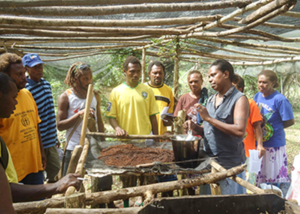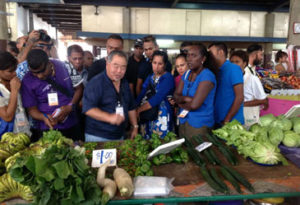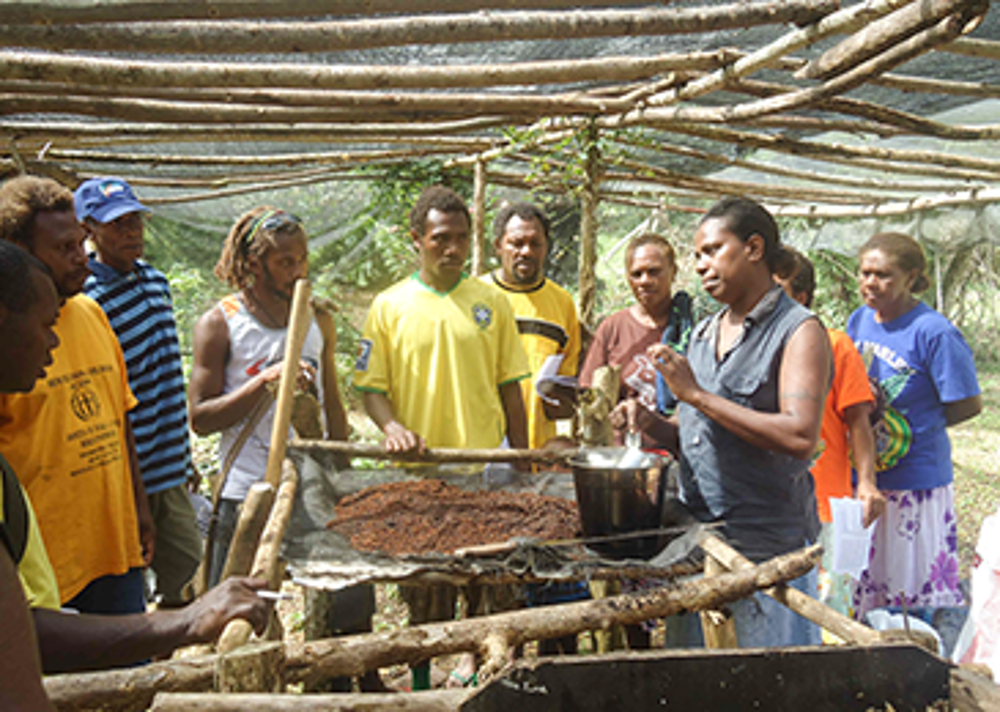 The historic climate change agreement reached at the United Nations Climate Change Conference (COP 21) has capped off a remarkable year for international development and for the Pacific Community (SPC). Here is part one of our news highlights (January to June).
The historic climate change agreement reached at the United Nations Climate Change Conference (COP 21) has capped off a remarkable year for international development and for the Pacific Community (SPC). Here is part one of our news highlights (January to June).
JANUARY
A decade of action commenced to draw attention to the importance of accurate civil registration and vital statistics in supporting good governance, decision making and the protection of human rights and legal identity.
With concern over high rates of teenage pregnancy and sexually transmitted infections, a collaborative effort involving SPC and other partners got under way to implement the Pacific Sexual Health and Well-Being Shared Agenda for 2015-2019.
Falling global oil prices brought some relief to Pacific Islands’ consumers who generally pay among the highest prices in the world at the petrol pump. SPC was optimistic that cheaper prices would not reduce the region’s momentum to a clean energy future.
Members of parliament from 11 Pacific Island countries affirmed their commitment to good governance and human rights with the release of a formal declaration, the 2015 Denarau Declaration on Human Rights and Good Governance – the first of its kind for the Pacific.
FEBRUARY
A new study revealed that allocating sufficient tuna for local consumption and keeping it affordable could significantly improve health outcomes in the Pacific. “A gap is emerging between how much fish can be harvested sustainably from well-managed reefs and the quantity of fish recommended for good nutrition. This study shows how the region’s rich tuna resources can be used to fill the gap,” the Director of SPC’s Fisheries Aquaculture and Marine Ecosystems Division, Moses Amos, said.
Tuvalu became the fourth Pacific country to enact specific legislation for deep sea mineral activities, alongside the Cook Islands, Fiji and Tonga.
A video, SPC: Small Steps, Big Vision, showed efforts by SPC to reduce the organisation’s greenhouse gas emissions by 30 per cent by 2016, across its main offices in Noumea, Suva, Pohnpei and Honiara.
A campaign for the 2015 International Year of Soils involving organic farmers was announced.
MARCH
Coinciding with the 20th anniversary of the Beijing Declaration and Platform for Action on gender equality, SPC released a significant report on progress and setbacks in 16 Pacific Island countries and territories since 1995.
Tropical cyclone Pam left significant damage in its wake in Vanuatu, Tuvalu, Solomon Islands and Kiribati. Responding to immediate requests for assistance, SPC deployed scientific and technical experts to Vanuatu and Tuvalu to assist, including reinforcing the national response and fisheries assessments and health surveillance.
Ahead of the World Conference on Disaster Risk Reduction, a video message from our Director-General appealed for the world to adopt a stronger approach to disaster risk reduction. In a statement delivered on behalf of SPC, Taito Nakalevu paid tribute to those affected by tropical cyclone Pam.
A new song for Pacific coastal fisheries was the centrepiece of recommendations from a fisheries forum held at SPC headquarters in Noumea, subsequently endorsed at the 9th biennial Pacific Heads of Fisheries meeting the following week. Meanwhile, SPC scientists harvested their first tissue culture breadfruit.
APRIL
SPC continued to mobilise its considerable scientific and technical expertise to support Pacific Community members impacted by tropical cyclone Pam. SPC’s Spatial Data Resources portal collated resources to assist humanitarian efforts, including a series of assessments by SPC of the extent of visible damage of population centres in Vanuatu using before and after satellite images provided by Digital Globe. Staff at our headquarters raised 1.17 million francs for Red Cross Cyclone Pam appeal.
Our attention turned to the north Pacific and the urgent restoration of crops and solar systems, and the provision of potable water, in the Federated States of Micronesia in the wake of typhoon Maysak.
We also bid a fond farewell to our Suva-based Deputy Director-General, Fekitamoeloa ‘Utoikamanu, at the end of her six-year term.
In a world-first, a survey module about back pain, arthritis and other musculoskeletal health problems was piloted in the Solomon Islands national Demographic and Health Survey. The musculoskeletal survey module was developed by the Global Alliance for Musculoskeletal Health and SPC.
Innovative features incorporated into the Republic of Palau’s 2015 national census of population, housing and agriculture saw Palau set a new standard for the Pacific region.
MAY
To provide valuable lessons for the future, initiatives from across the Pacific that address climate change and disaster risks were showcased in a new compendium.
And we joined with partners to celebrate the one-year countdown to the Festival of Pacific Arts 2016 in Guam.
SPC announced that the chikungunya virus had reached half of the 22 Pacific Island countries and territories and was likely to continue spreading to non-affected countries in the region and other parts of the world.
JUNE
 “Since SPC built the copra shed and provided the 10 hot air driers to the community, we’ve been able to produce 60 tons of copra which is worth around 300 thousand Vatu,” the Chief of Vanuatu’s Divers Bay, David Reuben, said of a USAID-funded food diversification project.
“Since SPC built the copra shed and provided the 10 hot air driers to the community, we’ve been able to produce 60 tons of copra which is worth around 300 thousand Vatu,” the Chief of Vanuatu’s Divers Bay, David Reuben, said of a USAID-funded food diversification project.
A partnership agreement deepening the collaboration between the European Union and SPC was signed in Suva by our Director-General, Dr Tukuitonga, and the European Commissioner for International Cooperation and Development, Neven Mimica. Dr Tukuitonga paid tribute to the European Union’s substantial support for development in the region during an address at a European Union Parliamentarian Forum in Suva.
A push for tourists to the Pacific Islands to see more local food on their plates was the focus of the first ever Pacific Community Agritourism Week (#PacAgriTo).
